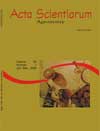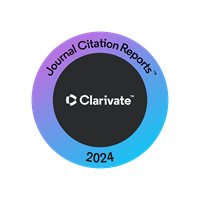<b>The effects of CPPU on the fruit development of kiwi cv. Bruno in the region of Guarapuava, State of Paraná, Brazil</b> - DOI: 10.4025/actasciagron.v27i2.1908
Abstract
The kiwi, as a dioecious plant, produces male and female flowers in different individuals which makes the pollination difficult - a necessary condition for good yields. A trial was carried out in an orchard in the region of Guarapuava, state of Paraná, Brazil, aiming at studying the effect of CPPU on the fruit development of kiwi cv. Bruno. The treatment consisted of spraying the flowers when 50% of them were opened with an aqueous solution of CPPU at 0, 2.5, 5.0, 7.5, 10.0 and 12.5 mg L–1, and also a treatment with hand-pollination was done. The treatment with CPPU and hand-pollination increased the fruit set, without changing the size and the weight of the fruits. The treatment with CPPU at 5 mg L–1 increased the percentage of fruit set from 54.6% on the control to 87.5%. Nevertheless, the treatment with CPPU at 12.5 mg L–1 decreased the total soluble solids content of the mosto.Downloads
Download data is not yet available.
Published
2008-04-07
How to Cite
Botelho, R. V., Kerniski, S., Mercer, R. M., Pott, C. A., & Müller, M. M. L. (2008). <b>The effects of CPPU on the fruit development of kiwi cv. Bruno in the region of Guarapuava, State of Paraná, Brazil</b> - DOI: 10.4025/actasciagron.v27i2.1908. Acta Scientiarum. Agronomy, 27(2), 243-246. https://doi.org/10.4025/actasciagron.v27i2.1908
Issue
Section
Crop Production
DECLARATION OF ORIGINALITY AND COPYRIGHTS
I Declare that current article is original and has not been submitted for publication, in part or in whole, to any other national or international journal.
The copyrights belong exclusively to the authors. Published content is licensed under Creative Commons Attribution 4.0 (CC BY 4.0) guidelines, which allows sharing (copy and distribution of the material in any medium or format) and adaptation (remix, transform, and build upon the material) for any purpose, even commercially, under the terms of attribution.
2.0
2019CiteScore
60th percentile
Powered by 

2.0
2019CiteScore
60th percentile
Powered by 




















































